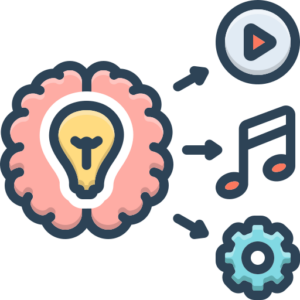In the dynamic and ever-evolving landscape of electronic music, talent and creativity are undeniably crucial. However, in an industry built on connection and collaboration, the ability to effectively network can often be the catalyst that transforms potential into a sustainable career. This chapter will delve into the profound importance of networking within the electronic music sphere, outlining the key stages and strategies for building a robust and beneficial professional network.
1. Why Networking is Not Optional
The electronic music industry, while seemingly digital and solitary at times, thrives on human connection. Networking is far more than just collecting business cards; it’s about building genuine relationships that can lead to opportunities, collaborations, knowledge sharing, and support.
- Access to Opportunities: Many of the best gigs, label signings, collaborations, and other career-advancing opportunities arise through personal connections rather than open applications.
- Knowledge and Mentorship: Engaging with more experienced individuals can provide invaluable insights, guidance, and help you navigate the complexities of the industry.
- Collaboration and Creative Synergy: Networking connects you with potential collaborators – producers, vocalists, visual artists, and other creatives – who can help you push your artistic boundaries.
- Building a Support System: The music industry can be challenging. A strong network provides a community for emotional support, shared experiences, and mutual encouragement.
- Staying Ahead of the Curve: Your network can be a vital source of information on emerging trends, technologies, and industry shifts.
2. Laying the Foundation: Defining Your Networking Goals
Before diving headfirst into networking, it’s essential to have a clear understanding of what you hope to achieve. Setting specific goals will help you focus your efforts and make your networking more effective.
- Identify Your Objectives: Are you looking for gig opportunities, a record deal, collaborators, mentorship, or simply to expand your industry knowledge?
- Define Your Target Audience: Who are the key players in the electronic music scene you need to connect with? This could include promoters, label owners, A&R managers, other artists, booking agents, music supervisors, or journalists.
- Understand Your Value Proposition: What do you bring to the table? Be clear about your unique sound, skills, and aspirations.
3. Building Your Web: Strategies for Connection
Networking in electronic music requires a multi-faceted approach, combining both online and offline strategies.
3.1 Online Networking: The Digital Realm
The digital space offers numerous avenues for connecting with the electronic music community.
- Social Media Engagement: Platforms like Instagram, Twitter, SoundCloud, and specialized music platforms are crucial for showcasing your music, engaging with fans, and connecting with industry professionals.
- Authentic Interaction: Don’t just follow; actively engage by commenting thoughtfully on posts, sharing relevant content, and participating in discussions.
- Showcasing Your Work: Regularly share snippets of your tracks, studio process, and live performances to keep your network updated on your creative output.
- Online Communities and Forums: Participate in online forums, Discord servers, and Facebook groups dedicated to electronic music production, specific genres, or industry topics.
- Sharing Knowledge and Offering Support: Contribute to discussions, answer questions, and offer help to others. This establishes you as a valuable member of the community.
- Discovering Opportunities: These platforms can be sources for collaboration requests, remix opportunities, and industry news.
- Professional Networking Platforms: While perhaps less emphasized than music-specific platforms, LinkedIn can still be valuable for connecting with industry business professionals, event organizers, and music technology companies.
3.2 Offline Networking: The Power of Face-to-Face
Despite the digital age, in-person interactions remain incredibly powerful for building stronger, more meaningful connections.
- Attending Industry Events: Conferences, festivals, workshops, and industry mixers are prime opportunities to meet a concentrated group of music professionals.
- Preparation is Key: Research attendees and speakers beforehand. Have a concise “elevator pitch” ready to introduce yourself and your music.
- Be Approachable and Engaged: Circulate, strike up conversations, and show genuine interest in what others are doing.
- Follow Up: Always follow up with new contacts after the event via email or social media.
- Going to Gigs and Club Nights: Support local artists and immerse yourself in the scene. This is a natural way to meet fellow musicians, DJs, promoters, and fans.
- Engage with Artists and Promoters: Introduce yourself after their set or event, offer genuine compliments, and express your interest in their work.
- Music Production Workshops and Masterclasses: These offer a chance to learn new skills and connect with instructors and fellow participants who share your passion.
- Collaborate in Person: Working on music projects together in a studio or shared space fosters deeper connections and a better understanding of each other’s creative process.
4. Nurturing Your Network: Building Lasting Relationships
Networking is not a one-time activity; it requires ongoing effort to maintain and strengthen relationships.
- Follow Up Consistently: Don’t let connections fade. Send occasional emails with updates on your music, share relevant articles, or simply check in.
- Offer Value: Think about how you can support your network. Share their music, recommend their work to others, or offer your skills for collaboration.
- Be Authentic and Genuine: People connect with real people. Be yourself and focus on building sincere relationships rather than transactional ones.
- Celebrate Others’ Successes: Acknowledge and congratulate people in your network on their achievements.
- Be Reliable and Professional: If you commit to something, follow through. Your reputation is crucial in this industry.
5. Leveraging Your Network for Advancement
Once you’ve built a network, it’s time to strategically leverage it to achieve your career goals.
- Seeking Advice and Mentorship: Don’t be afraid to reach out to trusted contacts for guidance and feedback.
- Exploring Collaboration Opportunities: Propose collaboration ideas to artists or producers in your network whose work you admire.
- Getting Introductions: If someone in your network has a connection you’d like to make, politely ask for an introduction.
- Finding Performance Opportunities: Let promoters and venue owners in your network know you’re looking for gigs.
- Exploring Label and Release Opportunities: If you have a demo ready, reach out to labels in your network that align with your sound.
Conclusion
Networking is an essential pillar for success in the electronic music industry. It’s a continuous process of building and nurturing relationships that can open doors, foster creativity, and provide invaluable support. By actively engaging with the community, both online and offline, and focusing on building genuine connections, electronic music artists and professionals can create a powerful web that propels their careers forward.





